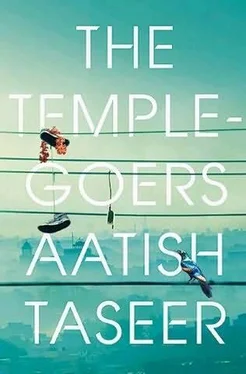‘Why me?’ I asked.
Aakash smiled, and draining his glass, said, ‘Because I think it’ll be good for you.’
And those words felt like reason enough. Aakash had broken into my afternoon with a gesture of friendship, made possible by its spontaneity; and from its success seemed to come this second invitation, now given rather than taken. Like the first, it was an acknowledgement of the mutual appeal our lives held for each other. But because it was instinctive, and inarticulate, and because behind that appeal I sensed some vague contest for power, it had to be taken for now – like certain childhood friendships – on trust.
I accepted his invitation and he gave me a date a few weeks later on which to be ready. Then looking round for his T-shirt, he rose to leave.
He had put his arms in as far as the sleeves when he stopped. ‘Thank you,’ he said. ‘It’s been so peaceful here this afternoon. I really needed it.’
When he had gone, I felt that he had come with one intention and realized another. I went home smelling of beer and cigarettes. And that night, on Sanyogita’s garden terrace, I noticed that the potted frangipani had died.
When I came back to Jorbagh, Sanyogita was in the drawing room. She wore her faded T-shirt and tattered tracksuit bottoms. Her legs were up on the sofa and the room was filled with pools of lamplight. They reached to the far corners of the high ceilings and emphasized the evening darkness. Sanyogita’s small, squat toes gnawed the edge of the sofa. She had her computer in her lap and was tapping away thoughtfully.
‘Baby!’ she said when I came in. She observed me carefully and seemed to sense something strange in my manner, smelt something perhaps, but said nothing directly. ‘Where have you been? I must have tried you half a dozen times.’
‘I’m sorry, I ran into my grandmother. I must have left the phone upstairs. What are you doing?’
‘Oh, nothing.’ She smiled. ‘ Vanity Fair has an annual world bazaar issue and I know this girl who’s doing it. She wants me to handle India. I may get a byline.’
‘That’s great. Do you want to have a bath?’
‘Yes! It’s just what they need,’ she said, wiggling her toes.
‘They?’
‘Baby, them!’ She gestured to her toes; they wiggled happily.
We had an ongoing joke where we ascribed human characteristics to her toes.
‘Oh, them!’
‘Yes, they would hate to be left out!’ They fanned from side to side as if they were about to get up and follow me into the bathroom.
‘OK, but come quickly.’
‘Baby, don’t make it too hot.’
I walked towards Sanyogita’s room, past my study with its red carpet and the garden terrace with its dahlias. There was no moon and the night filled the little terrace. I was about to enter Sanyogita’s room when, from the light of a naked bulb, I made out the shape of a potted frangipani. From where I stood, its leaves seemed to droop and its trunk and branches had an unhealthy, pulpy texture. I pushed open the door to the terrace to take a better look.
Even before my eyes had fully adjusted to the darkness I could see that the tree was dead. Its trunk and branches had begun to soften and their ends were shrivelled. The large broad leaves hung on like the open eyes of a corpse. We hadn’t planted the garden ourselves; we had inherited it. And the death of the slim-limbed frangipani only weeks before it was meant to flower gave me a terrible intimation of the whole garden dying on our watch.
In the time between leaving the terrace and opening the bath taps, I came to blame Sanyogita for the tree’s death. It was not because she was in charge of the garden – I was – but because I had noticed and I knew she never would have. I worked myself into thinking that her not noticing was an aspect of a deeper complacency: how almost two years after finishing college she had no more idea of what she wanted to do than when she graduated; how she preferred cities like London and New York, with their cinemas, restaurants and Sunday papers, to all that India had to offer; how she was always late for everything; and how she now sat in her drawing room, wasting her time doing someone else’s work.
I got into the bath, full of irrational rage. I knew that Sanyogita, in her mulish way, would carry on doing her work till the bath went cold. But I didn’t want to call her because I enjoyed letting my anger grow. The water was hot and burned my skin. I sat there until it became tepid and seemed to cling to me. I felt a sick excitement when Sanyogita came in at last. I said nothing about the bath’s temperature. I just lay there looking up at the saucer-shaped ceiling light.
When Sanyogita took off her clothes, I watched her. I saw her pale skin, her big bones, the caterpillar scar that ran across her hip from the skiing accident and her low-slung breasts. She saw me looking at them and became shy about the way her nipples had expanded. She dipped her hand into the bath so that she could harden them. It was then that her frank smile turned to confusion. Why was I lying in a bath that had gone cold? She could see that all wasn’t well with me, but she was happy to get in the bath anyway, happy just to add some hot water and bear it for my sake, happy just to be in the bath with me. But as soon as she put one foot in and then the other, letting her large, smooth body sink into the few feet of soapy water, I got out of the bath and left the room without a word.
I saw her face as I left the bathroom, the smile, the confusion and at last the hurt.
When Sanyogita came out of the bathroom a few moments later, she was crying. She always cried silently, but her face was wet with tears, a different wetness from the glisten of her body. She lay down on the bed, just as she was, and wept.
I lay down next to her, noticing the things I found beautiful about her: the straight, strong bones of her shoulders and the paleness of the skin that collected over them now that her arms were raised; her smooth shiny black hair that dropped in steps down her back; the single skin-covered mole on her back which, if I ever touched, she asked me to be kind to as it was the only one.
Sanyogita, as if acknowledging the seriousness of the fight, didn’t push me away when I lay down next to her. She seemed to be considering what the real problem might be. With the side of her face pressed against the bed, she said, ‘Baby, is it necessary that you revise your novel here?’
‘In Delhi or India?’ I asked.
‘Both,’ she said, the conversation calming her down.
‘No, I suppose not.’
‘Because I’d like to go away for a while. And I want you to come with me.’
She seemed at once to warn me and to bring me in. The fact that she had already read into the deeper vibrations of our fight, and felt no need to state them but had moved on to a solution, gave her an authority over me.
‘How long?’ I asked.
‘The summer.’
‘Where do you want to go?’
‘Europe, America, anywhere. This place gets to me after a while, that’s all. I need to be reminded that there’s another world out there, a world where I feel better about myself.’
I didn’t want to, but I gave in. I felt paralysed by the onset of the heat. I wanted to drink lime waters all summer, wear white salwar kameez and finish my revisions in my new study. My life in Delhi had acquired a serenity beyond all my expectations. The revised version of the novel was seeming much better to me. I wrote early in the mornings. Vatsala had learned to make coffee in the Italian percolator. It spat out a thick dark liquid. She mixed it with hot milk and brought me two mugs a morning. The effect of the coffee and the quiet work made me restless for Junglee. I’d spend an hour there and come back to a light vegetarian lunch with Sanyogita. Zafar came every afternoon. After he was gone, I’d walk three rounds of Lodhi Gardens. The park at that hour was filled with overweight women in salwar kameez and sneakers, slim-bodied young men hanging on each other, couples canoodling and old men in white shorts. There were also faces from the area: the Sikh gentleman who owned a bookshop called The Bookshop; the feuding brothers who owned The Music Shop in Khan Market; and an Australian woman who wore pink turbans and flowery dresses and bred beagles. After the walk, I’d read over my writing, drink a glass of wine and resist efforts to make me go out. I didn’t want the slog of life in the West; I didn’t want cosmopolitan life. I was tired of subtitled movies and Sunday supplements.
Читать дальше












